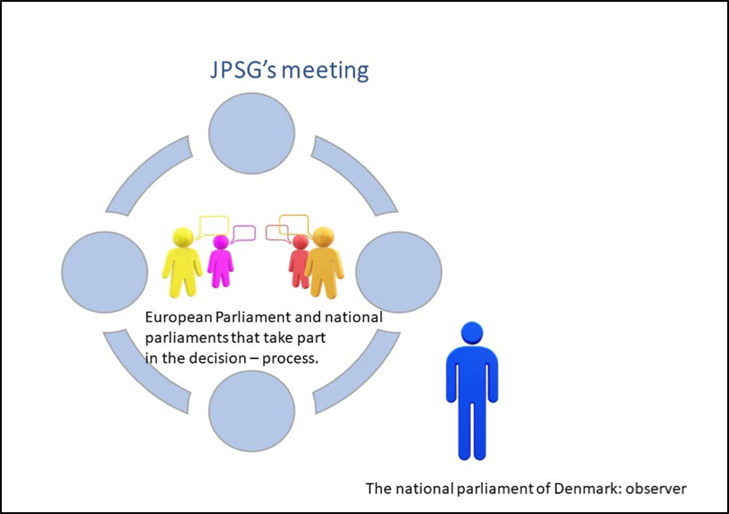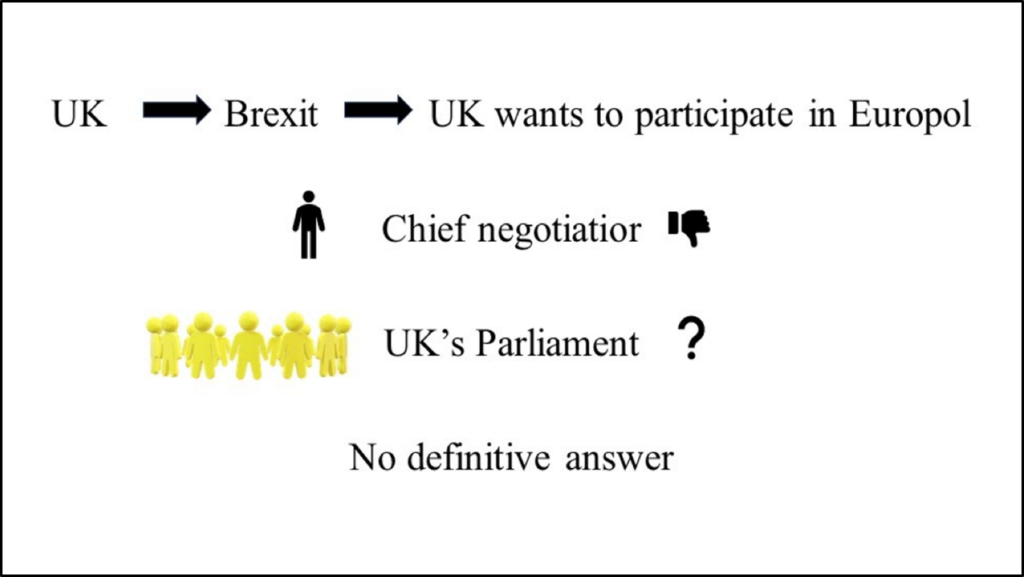Alessia, Chiara, Kristin & Silvia
By the EU Speakers Conference in 2017, the European Parliament (EP) and the national parliaments (NPs) have become part of the Joint Parliamentary Scrutiny Group (JPSG). This group, composed of the EP and the NPs, provides for the direct political monitoring of Europol’s activities. As such, the question is whether this automatically means that only EU Member States (MSs) participating in Europol can be part of the JPSG. For instance, Denmark, which has not adopted the Europol Regulation, has wanted to attend the JPSG meetings with a voting capacity. Similarly, following the Brexit referendum, the UK has ceased to be part of Europol. Thus, its participation in the JPSG has become uncertain. After two years of debating, Denmark has got to participate in the JPSG without a right of decision. This blog post argues that a similar agreement of that with Denmark should not be expected for the UK, because the latter is not an EU MS. Given its different status, it seems unrealistic that a potential UK-Europol agreement will provide for the UK’s similar position in the JPSG. However, this decision is still pending.
The ‘Danish question’?
The 2015 Denmark referendum concerned the conversion of Denmark’s participation in the area of freedom, security and justice (AFSJ), from a full opt-out to a partial one, with opt-ins on a case-by-case basis. Such conversion would have permitted Denmark to remain in Europol. However, the referendum was voted against. Afterwards, Europol and Denmark have signed an operational and strategic cooperation agreement to continue to protect citizens. And, most importantly, Denmark does not apply the Europol Regulation (recital 74 Europol Regulation). Thus, the problem concerning Denmark’s participation in the JPSG appeared before the first meeting of the JPSG in October 2017. On this occasion, some parliaments were opposed to Denmark’s involvement in the JPSG meetings. The Danish Parliament claimed it was unusual for a NP not to participate in the EU interparliamentary cooperation. For example, even the parliaments of non-signatories of the Fiscal Compact Treaty participated in the SECG Conference as full members. The EP legal service stated that neither the Treaties nor the Europol Regulation provide an answer to this issue. Therefore, Danish participation is a political decision that the JPSG itself must take.
Denmark in JPSG’s working group
Since Denmark had signed the cooperation agreement, during JPSG’s first meeting, it could participate as an observer (figure 1), preventing it from taking part in the decision process.

A comprise was reached in the second meeting thanks to creating a working group to solve the Danish question. The working group was composed of the Danish Parliament and the Presidential Troika. They can provide recommendations on revising the JPSG’s Rules of Procedure (RoP), which occur every two years. As for the Danish position, its parliament expressed great interest in the JPSG’s work and in being associated and participating closely. After several debates about the Danish Parliament’s participation in the JPSG, the fifth meeting in 2019 gave a definite answer to the matter. During it, the JPSG reviewed its RoP and amended them with a Protocol to establish Denmark as a member with limited rights, instead of a mere observer. The Danish delegation welcomed such a decision. The set of amendments and the protocol were adopted by consensus, and the RoP were finally modified.
How can today the Danish Parliament participate in the JPSG’s meetings? And, how can the found solution be evaluated?
The Danish Parliament can attend every meeting of the JPSG, ask questions to Europol and request documents. Nevertheless, the Danish Parliament’s power is limited. It cannot preside over meetings of the JPSG nor participate in the decision-making of the JPSG or attend the Management Board Meetings of Europol as a JPSG representative. The limited participation of Denmark seems appropriate considering the importance of Europol’s scrutiny on compliance with fundamental rights. Also, its effective control depends on a comprehensive and positive working relationship between all NPs and the EP. Overall, it shows that it is indeed possible for a MS that has rejected Europol Regulation’s adoption to scrutinize Europol, at least to a certain extent. However, despite this cannot be seen as an overarching solution since the amended Protocol mentions in particular Denmark, this might be an approach for similar future questions.
Is a similar agreement to the one of Denmark expected in the UK?
An interesting comparison to Denmark is the UK, which opted out of the AFSJ in 2014 but still participated in Europol. Following the Brexit referendum, the UK expressed its intention to remain in Europol. However, in 2017, the EU’s chief negotiator opposed such a prospect, as he considered the UK’s non-participation in Europol a logical outcome of Brexit. The UK Parliament’s role in the JPSG is thus uncertain and dependent on the UK’s accession to Europol (figure 2).

In the JPSG’s 7th meeting in 2020, participants stressed the importance of sharing information to combat crime and that an efficient partnership between the EU and the UK was in the interest of both parties. The necessity for an agreement between the EU and the UK was thus favoured, but no definitive answer was reached. One can question what role will the UK’s Parliament have in the case of an agreement, and whether a similar working arrangement to the Danish one is expected in the UK’s case. In our opinion, even if an agreement was to be reached, it is unlikely that it will be as beneficial as the one of Denmark, given the UK’s status as a third-country. Moreover, the UK Parliament’s role in the JPSG will likely be less privileged i.e. no automatic right of participation nor the right to ask questions, limiting considerably the UK’s ability to scrutinize Europol. Therefore, the JPSG is finally a reality in Denmark. And, we will see how the situation of the UK will evolve.
